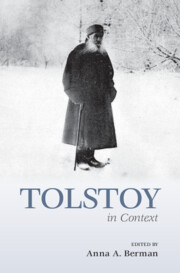Book contents
- Tolstoy in Context
- Tolstoy in Context
- Copyright page
- Contents
- Figures
- Notes on Contributors
- Preface
- Acknowledgments
- Note on Citations, Translations, and Transliterations
- Chronology
- Part I The Man
- Part II Russian Social and Political Contexts
- Part III Literature, the Arts, and Intellectual Life
- Part IV Science and Technology
- Part V Beyond Russia
- Chapter 29 Pacifism and the Doukhobors
- Chapter 30 America
- Chapter 31 India
- Chapter 32 Eastern Religion
- Chapter 33 English Varieties of Religious Experience
- Part VI Tolstoy’s Afterlife
- Suggested Further Reading
- Index
Chapter 29 - Pacifism and the Doukhobors
from Part V - Beyond Russia
Published online by Cambridge University Press: 05 January 2023
- Tolstoy in Context
- Tolstoy in Context
- Copyright page
- Contents
- Figures
- Notes on Contributors
- Preface
- Acknowledgments
- Note on Citations, Translations, and Transliterations
- Chronology
- Part I The Man
- Part II Russian Social and Political Contexts
- Part III Literature, the Arts, and Intellectual Life
- Part IV Science and Technology
- Part V Beyond Russia
- Chapter 29 Pacifism and the Doukhobors
- Chapter 30 America
- Chapter 31 India
- Chapter 32 Eastern Religion
- Chapter 33 English Varieties of Religious Experience
- Part VI Tolstoy’s Afterlife
- Suggested Further Reading
- Index
Summary
This chapter provides a summary of the deep-rooted connections between Canadian Doukhobors (Doukhobortsy or Spirit Wrestlers) and Tolstoy, starting with important anti-militaristic events organized by the Doukhobor leader Peter Verigin at the end of the nineteenth century: refusals to serve in the army and the Burning of the Weapons in Doukhobor villages in the Caucasus, Russian Empire. These events as well as the following severe persecutions of Doukhobors in Russia caught the attention of Tolstoy because this peasant anti-militaristic movement resembled his own peaceful non-resistance teachings. Tolstoy became one of the most passionate protectors and a dear friend of the Doukhobors, commending their pacifism in his works. The chapter describes the first encounter of a group of Doukhobors with Tolstoy, and Tolstoy’s friendship and correspondence with Peter Verigin, as well as the pivotal role played by Tolstoy in organizing and funding the Doukhobors’ immigration to Canada. In conclusion, the author points out a few other correspondences between Tolstoy’s teachings and Doukhobor beliefs, such as agrarianism, communal cultivation of land, the unity of people, and rejection of Church institutions and priests. The chapter highlights the significance of pacifism (as it is understood by Tolstoy and the Doukhobors) in contemporary context.
Keywords
- Type
- Chapter
- Information
- Tolstoy in Context , pp. 239 - 246Publisher: Cambridge University PressPrint publication year: 2022



